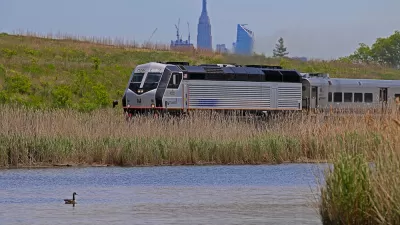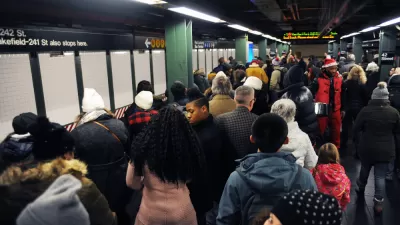WNYC's Andrea Bernstein speaks to "super-commuters", who travel regularly from home to work by air, and uncovers a new way of thinking about where we live and where we work.
The commuter mode split for New York City looks different in the most recent census than it did a decade ago. Notably, some 4,000 commuters hop a plane to work, a demographic that didn't even appear in previous census data. Director of NYU's Rudin Center, Mitchell Moss notes that this growing trend indicates a collapse of regional boundaries as distance is no longer seen as a barrier.
Major shifts in the economy and technology are driving the acceptance of regular air commuting. While much of the country has seen job loss, New York City is still full of high paying jobs. The cost of living in the City remains high, however, and, more importantly, home values elsewhere have fallen to the extent that many families that might have moved are stuck with homes they can't sell. Job insecurity is another justification for super-commuting, as families resist uprooting with each job change.
Advances in technology has also enabled air commuting. A variety of communication and social networking devices make it easier to stay connected to friends and family while traveling. Additionally, widespread internet access means people don't have to be at the office to connect to work. Super-commuter, Dave Gustafson, points out that he "never set(s) the ‘Out-of-Office' reply on my email. I'm never really out of the office."
Gustafson describes another benefit of his air commute which points to a shift in our concept of home, office and belonging to a place:
"Because I travel like this I'm not locked into living in a particular area. We're talking about relocating to another part of the country, and I don't have to find a new job, so long as I'm near an airport. We can pick our place."
Thanks to Jessica Brent
FULL STORY: Air Commuters Growing in Number

Alabama: Trump Terminates Settlements for Black Communities Harmed By Raw Sewage
Trump deemed the landmark civil rights agreement “illegal DEI and environmental justice policy.”

Study: Maui’s Plan to Convert Vacation Rentals to Long-Term Housing Could Cause Nearly $1 Billion Economic Loss
The plan would reduce visitor accommodation by 25% resulting in 1,900 jobs lost.

Planetizen Federal Action Tracker
A weekly monitor of how Trump’s orders and actions are impacting planners and planning in America.

Wind Energy on the Rise Despite Federal Policy Reversal
The Trump administration is revoking federal support for renewable energy, but demand for new projects continues unabated.

Passengers Flock to Caltrain After Electrification
The new electric trains are running faster and more reliably, leading to strong ridership growth on the Bay Area rail system.

Texas Churches Rally Behind ‘Yes in God’s Back Yard’ Legislation
Religious leaders want the state to reduce zoning regulations to streamline leasing church-owned land to housing developers.
Urban Design for Planners 1: Software Tools
This six-course series explores essential urban design concepts using open source software and equips planners with the tools they need to participate fully in the urban design process.
Planning for Universal Design
Learn the tools for implementing Universal Design in planning regulations.
Caltrans
Smith Gee Studio
Institute for Housing and Urban Development Studies (IHS)
City of Grandview
Harvard GSD Executive Education
Toledo-Lucas County Plan Commissions
Salt Lake City
NYU Wagner Graduate School of Public Service




























